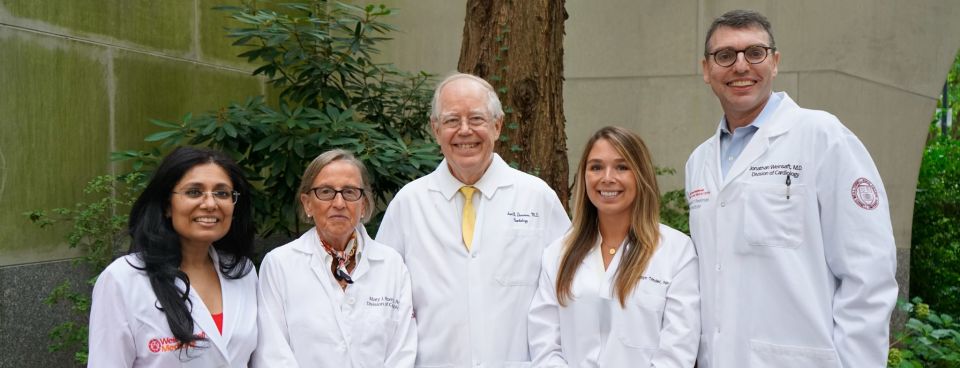Marfan Syndrome and Aortopathy
The Marfan Syndrome and Aortopathy Program at Weill Cornell Medicine is a major center for patients and families with Marfan syndrome, aortopathy, and related conditions. Our faculty includes internationally recognized experts in the field, including Dr. Richard B. Devereux and Dr. Nupoor Narula, who have evaluated and, since 1984, treated hundreds of patients with Marfan syndrome, familial aortic aneurysm, mitral valve prolapse, and related conditions, as well as Dr. Mary J. Roman who serves as the director of the Cornell Aortic Aneurysm Registry, a major resource for clinical research in this field, and Dr. Jonathan W. Weinsaft, a leading expert in cardiac magnetic resonance imaging in individuals with aortopathies. With a history of treating patients of different ages, our team has learned how to best treat and manage Marfan syndrome and aortopathy and achieve the highest possible quality of life for our patients.
What is Marfan Syndrome and Aortopathy?
Marfan syndrome is a genetic disorder that affects the body’s connective tissue. This disorder can affect many different parts of the body, including causing aortic enlargement (aneurysm) in the aorta. The aorta is the largest artery in the human body and is responsible for carrying blood from your heart to the rest of your body. Aortopathy (aortic disease) is a group of conditions affecting your aorta. When the wall of the aorta or other arteries is disrupted, serious complication may occur. However, with early diagnosis—along with expert treatment and management—patients with Marfan syndrome and aortopathy are living longer and more fully than ever before.
Specialized, Individualized Care at Weill Cornell Medicine
At Weill Cornell Medicine our center provides individualized multidisciplinary care including cardiology and access to medical genetics, cardiothoracic surgery, vascular surgery, ophthalmology, orthopedic surgery, and maternal-fetal medicine (high-risk obstetrics).
Our world-class cardiothoracic surgeons perform complex aortic surgery including valve-sparing root replacement, composite valve-graft surgery, repair of thoracic aortic aneurysms and dissections and mitral valve procedures with exceptionally low complication rates. Our vascular surgeons specialize in surgery on the aorta and branch vessels and endovascular procedures.
NewYork-Presbyterian Hospital/Weill Cornell Medicine has a longstanding history of excellence in the care of patients with Marfan syndrome and related aortopathy conditions. Individuals with these conditions as well as those with other thoracic aortic or arterial diseases are evaluated by experts to determine the underlying condition, screen for genetic mutations and occurrence in other family members, and determine medical and surgical therapy. Comprehensive evaluations include imaging by echocardiography, computerized tomographic angiography (CTA) or magnetic resonance angiography (MRA), and assessments by other subspecialists.
Many of these disorders have a known or likely underlying genetic basis, including:
- Marfan syndrome
- Loeys-Dietz syndrome
- Bicuspid aortic valve associated with thoracic aortic aneurysm
- Vascular Ehlers-Danlos syndrome
- Non-syndromic heritable thoracic aortic disease (HTAD) or familial thoracic aortic aneurysm and dissection disease (FTAA/D)
- Turner syndrome
- Aortic or coronary artery dissection or fibromuscular dysplasia
- Unexplained thoracic aortic aneurysm at relatively young age.
Families, especially those with a non-Marfan familial aortic aneurysm, may undergo additional testing to characterize underlying genetic abnormalities.
As a patient we will arrange an evaluation that results in a tailored treatment plan to you. This may include:
- Preventive medications
- Lifestyle modifications
- Helping you understand the genetic and familial factors of your condition, including family assessment and screening, if appropriate
- Aortic imaging using the latest technologies through our cardiology and radiology departments
- Multidisciplinary care coordination with other specialists
Our Program and Research
The results from clinical research at Weill Cornell Medicine has advanced knowledge of Marfan syndrome and aortopathy in over 100 publications and provided answers to many questions about these conditions posed by patients and referring physicians. The Marfan Syndrome and Aortopathy Program at Weill Cornell Medicine has hosted the Annual Meeting of the Marfan Foundation and is actively involved in research involving heritable thoracic aortic diseases utilizing the Cornell Aortic Aneurysm Registry which includes over 800 patients and collaborative studies with other major centers in this field. Our program has also hosted the Annual Meeting of the Marfan syndrome and symposia on the Marfan syndrome and related conditions for patients and health care providers.
Schedule an Appointment
To schedule an appointment to see one of our physicians with expertise in Marfan syndrome and aortopathy, please call (646) 962-4733.
If you are already an established patient, you may also request an appointment online using Weill Cornell CONNECT. We will make every effort to contact you within 24 hours.
Our staff is here to help coordinate your care. They will provide you with information on our physicians, their areas of expertise and help arrange for your visit and other testing when appropriate.
Preparing for Your Appointment
To prepare for your appointment please bring any relevant medical records and family information to your appointment, such as:
- Echocardiogram reports and, if possible, DVDs
- CT scans or MRIs of the chest and abdomen
- Dilated eye examination
- Any genetic evaluations
- Autopsy reports, if pertinent
Our Physicians
| Faculty | Title | Phone | ||
|---|---|---|---|---|
 |
Richard B. Devereux, M.D. |
Professor of Medicine, Director Adult Echocardiography Laboratory | 646-962-4733 | Full Profile |
 |
Jonathan W. Weinsaft, M.D. |
Chief, Greenberg Division of Cardiology, A.M. Gotto Professor of Medicine, Atherosclerosis and Lipid Research | 646-962-5558 | Full Profile |
 |
Nupoor Narula, M.D. M.S.c. |
Assistant Professor of Medicine, Director Cardiology Vascular Laboratory, Director Women's Heart Program | 646-962-4733 | Full Profile |


